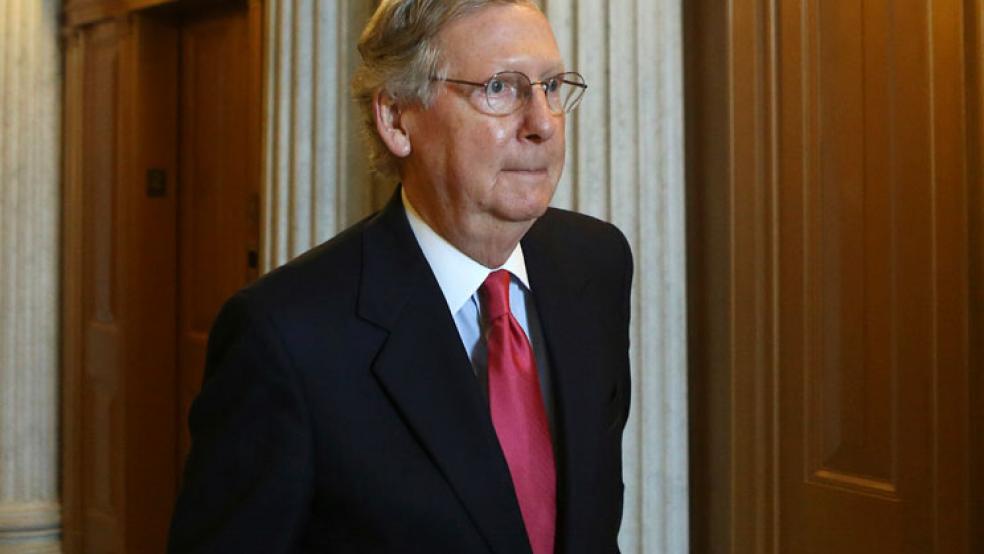Sen. Mitch McConnell of Kentucky got his dream job of Majority Leader in January after Republicans pulled off a landslide victory over the Democrats last November that put the GOP back in control of both the Senate and House for the first time in nearly a decade.
Republicans were blessed with just about every imaginable advantage. President Obama’s approval ratings were in the tank. The GOP had few seats to defend. And the Democrats were forced to defend seven seats in swing states that Republican presidential nominee Mitt Romney easily carried in 2012. When the dust finally settled, the Democrats lost all seven seats and they were tossed out of control.
Related: McConnell Vows a New Senate That Will Get Things Done
Now, as veteran political analyst Charlie Cook noted in National Journal this week, “the tables are turned,” and McConnell could be out of his majority leadership post after the 2016 election.
Right now, the Republicans hold 54 seats in the Senate, compared to 44 for the Democrats and two other independents who caucus with the Democrats.
Republicans will be forced to defend 24 seats in the next cycle, compared to only 10 seats that will be on the line for the Democrats. “While President Obama carried all 10 of the Democratic-held seats up this cycle,” Cook writes, “he also carried seven states with Republican-held seats: Florida (Marco Rubio), Illinois (Mark Kirk), Iowa (Chuck Grassley), New Hampshire (Kelly Ayotte), Ohio (Rob Portman), Pennsylvania (Pat Toomey), and Wisconsin (Ron Johnson).”
In order to win back the majority, the Democrats would need to pick up just four seats, provided their party retains control of the White House and the new vice president breaks a deadlock. Or they would need a pickup of five seats if the Republicans manage to prevail in the presidential race.
Political prognostication of this sort a year and a half out from the election is always risky, of course, and the political variables that go into the calculations are substantial. Few would argue that the outcome of the presidential campaign will have an enormous influence on the Senate and House races.
Yet with the GOP field of announced and potential candidates so vast and unwieldy and former Secretary of State Hillary Rodham Clinton struggling to position herself with the Democratic Party’s liberal wing, forecasting the outcome of the presidential election at this point is sheer folly.
Related: Obama’s Key Foreign Policies Live or Die in GOP Hands
Moreover, as Cook points out, events will dictate the outcome of Senate races in some of the most hotly contested states.
The Cook Political Report puts two Republican-held seats in the "Toss Up" category—the Florida seat that Marco Rubio is giving up to run for president and Kirk’s seat in Illinois. That toss-up category will almost certainly grow, especially if Democratic Gov. Maggie Hassan challenges Ayotte in New Hampshire, former Democratic senator Kay Hagan takes on Republican Sen. Richard Burr in North Carolina, and former Democratic senator Russ Feingold seeks a rematch with Johnson in Wisconsin, according to Cook. And if the Democrats can recruit a top-flight candidate in Pennsylvania, then Republican Sen. Pat Toomey could be facing a tough reelection challenge.
As long as Sen. Chuck Grassley (R-IA) runs for a seventh term -- which now seems to be the case – it is highly unlikely that the Democrats could mount a credible challenge to him.
Related: From the Senate to the Cities, Dems in Disarray on Trade
“Under the right conditions — i.e., strong Democratic Senate candidates combined with a solid national lead for the Democratic presidential nominee — all seven of the other seats are vulnerable,” University of Virginia political analyst Larry J. Sabato wrote earlier this year.
Three of the states -- Illinois, Pennsylvania and Wisconsin --are more Democratic than the country as a whole and are inclined to vote for a Democrat for president even when the party loses a close race nationally, as in 2000 and 2004, according to Sabato. “This reality has placed Kirk, Toomey and Johnson at the top of the endangered senators list,” according to Sabato.
This should all be music to the ears of Sen. Chuck Schumer of New York, the third-ranking Democrat who is in line to succeed retiring Minority Leader Harry Reid of Nevada next year. Schumer would be catapulted into the Majority Leader’s job if his party wins back a majority.
Top Reads From The Fiscal Times:





